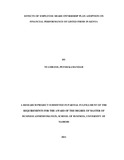| dc.description.abstract | iv
ABSTRACT
There is still no consensus on the impact of ESOPs on performance of companies. While some authors propose that the existence of an ESOP will add to firm value by aligning the incentives of employees with those of the shareholders, others argue that ESOP participants will use their ownership voice to push for increasing wages and benefits, to the detriment of the shareholders. The differences in results could be due to the methodologies adopted as researchers have used various methods to carry out the same. The environments in which these studies are carried out are also varied hence the variations in results. These conflicting results, coupled with the fact that little had been done on ESOPs in Kenya offers a gap in literature that the present study sought to address. The objective of this study was to assess the effect of ESOPs on the financial performance of companies listed on the Nairobi Stock Exchange.
This study adopted a descriptive survey design. The population of this study was all the 56 firms listed on the Nairobi Stock Exchange. A sample size of 18 firms was selected where 9 ESOP firms were matched with 9 non-ESOP firms. Secondary data on ESOPS, total assets, cash flows, sales, and net income were collected from the annual reports from the CMA, NSE, company premises and websites. This was collected for the period 2008-2010. Data was analysed using descriptive analysis, univariate analysis, correlation analysis, and multiple regression analysis using the SPSS. The results were presented in tables.
The study found that 16% of the firms listed on the NSE have ESOPS. Through the use of t-tests, the study failed to ascertain a statistically significance difference between the performance of ESOP firms and non-ESOP firms. The regression results showed that ESOPs
v
did not significantly influence performance of firms when ESOP was measured as a dummy variable. However, when ESOP was measured as a percentage of total shares, it had a significant positive effect on net profit margin (R=0.875, p=0.022) while it remained statistically insignificant with the rest of the performance measures (p>0.05). Consistent with prior studies in this area, the study concludes that ESOP firms‘ performances are not significantly different from those of non-ESOP firms. The study also concludes that ESOPs do not significantly influence performance per se except for when the shares form a substantial proportion of the total shares in which case they mostly affect the net profit margin of a firm. The study recommends that given that there is a potential for ESOPs to significantly influence performance in terms of net profit margin, firms adopting the same need to substantially offer more shares to all employees. | en |

